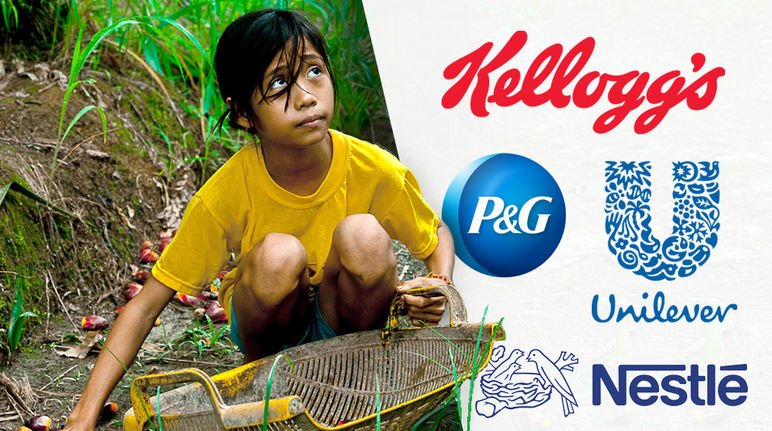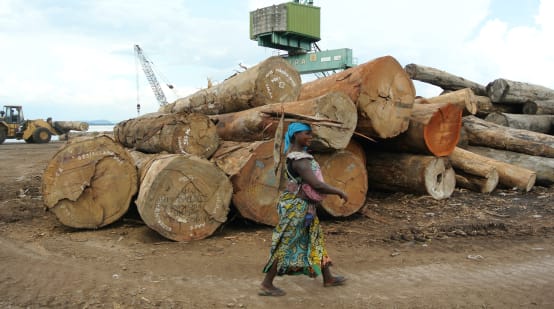Kellogg’s, Nestlé, Unilever: NO to child labor for palm oil!
 Children often have to help their parents meet their daily harvesting quotas (© Jason Motlagh - Montage RdR)
Children often have to help their parents meet their daily harvesting quotas (© Jason Motlagh - Montage RdR)
Instead of going to school, many children are forced to work on the oil palm plantations of the Wilmar Group and affiliated companies. According to Amnesty International, child labor taints the palm oil used by numerous household brands: Colgate-Palmolive, Kellogg’s, Nestlé, Procter & Gamble and Unilever.
Call to actionTo: Palm oil producers and their customers: Wilmar and suppliers, Colgate-Palmolive, Kellogg's, Nestlé, Unilever and Procter & Gamble
“The palm oil industry and its buyers must put an end to child labor, forced labor and other systematic human rights violations NOW.”
The palm oil industry is trashing the rainforests. Worldwide, plantations already cover 27 million hectares, an area larger than the UK. Nature and endangered animals such as orangutans are not the only ones feeling the pressure – the plantation workers also suffer under the ruthlessness of the palm oil industry.
The human rights organization Amnesty International has documented systematic human rights violations on oil palm plantations in Indonesia in its report The Great Palm Oil Scandal: Labour Abuses Behind Big Brand Names.
These include child labor and forced labor, discrimination against women, and exploitative and hazardous labor practices that endanger the health of the workers. These are not isolated incidents, but established business practices of companies in the Wilmar Group and their suppliers. Singapore-based Wilmar is the world’s largest palm oil vendor.
Children aged 8 to 14 years are forced into dangerous work. According to Amnesty, some no longer go to school because they have to help their parents meet their harvesting quotas.
Household brands such as Colgate-Palmolive, Kellogg's, Nestlé, Unilever and Procter & Gamble all profit from the cheap oil produced without regard to human rights or the environment.
Please sign our petition to the palm oil producers and their customers calling for a stop to the abuses.
BackgroundAmnesty International’s allegations about the scandalous working conditions in the palm oil industry are not new. In 2011, the environmental NGO Rainforest Action Network (RAN) accused the KLK group and its customer Cargill of grave human rights violations in its report, Cargill: Keep Slave Labor Out of US Grocery Stores. In 2014, RAN published a further report, Child Labor, Land Grabbing and Deforestation Rampant Across Palm Oil Giant KLK’s Operations.
In his 2013 article in Bloomberg BusinessWeek, Benjamin Skinner documented how workers on oil palm plantations are forced into the toughest and most dangerous jobs, held captive, beaten and cheated of their wages – men, women and children toil seven days a week in virtual slavery.
Skinner and his team spent nine months studying working conditions on oil palm plantations in Indonesia. Workers on the Malaysian KLK Group’s plantations were lured by false promises, deprived of their personal documents and commandeered into forced labor.
Western corporations such as Cargill continue to supply palm oil tainted by human rights violations to major food manufacturers such as Nestlé, Kellogg’s and Unilever, and to the biodiesel industry.
Reports from neighboring Malaysia also mention thousands of children working on oil palm plantations. Palm Oil for the West, Exploitation for Young Workers in Malaysia. The products of child labor and forced labor are thus making their way onto our dinner tables and into our fuel tanks in the form of margarine, cereals, chocolate spread and biodiesel.
Amnesty International press release: Palm Oil: Global brands profiting from child and forced labour
Amnesty International study: The Great Palm Oil Scandal: Labour Abuses Behind Big Brand Names
Saurlin P Siagian, Amin Siahaan Buyung and Nur Khairani (2011): The Loss of Reason. Human Rights Violations in the Oil-Palm Plantations in Indonesia
Saurlin Siagian and Lentera Rakyat (2012): From Bad to Worst. Palm Oil Expansion Impacts, Indonesia Case, Presentation
To: Palm oil producers and their customers: Wilmar and suppliers, Colgate-Palmolive, Kellogg's, Nestlé, Unilever and Procter & Gamble
Ladies and Gentlemen,
Amnesty International raises serious allegations against palm oil producers and their customers: In the oil palm plantations it studied, the organization observed systematic violations of fundamental human and labor rights.
We call for an immediate end to forced labor and child labor and exploitative and hazardous working conditions on oil palm plantations. We also call on buyers not to purchase palm oil from companies that cannot ensure the strict observation of human and labor rights.
Sincerely,
The issue – rainforest on our dinner tables and in our fuel tanks
At 66 million tons annually, palm oil is the most commonly produced vegetable oil. Its low world market price and properties that lend themselves to processed foods have led the food industry to use it in half of all supermarket products. Palm oil can be found in frozen pizzas, biscuits and margarine, as well as body creams, soaps, makeup, candles and detergents.
Few people realize that almost half of the palm oil imported into the EU is used as biofuel. Since 2009, the mandatory blending of biofuels into motor vehicle fuels has been a major cause of deforestation.
Oil palm plantations currently cover more than 27 million hectares of the Earth’s surface. Forests and human settlements have been destroyed and replaced by “green deserts” containing virtually no biodiversity on an area the size of New Zealand.
The impact – suffering and death in producer countries, climate havoc
The warm, humid climate of the tropics offers perfect growth conditions for oil palms. Day after day, huge tracts of rainforest in Southeast Asia, Latin America and Africa are being bulldozed or torched to make room for more plantations, releasing vast amounts of carbon into the atmosphere. As a consequence, Indonesia – the world’s largest producer of palm oil – temporarily surpassed the United States in terms of greenhouse gas emissions in 2015. With their CO2 and methane emissions, palm oil-based biofuels actually have three times the climate impact of traditional fossil fuels.
Palm oil is not only bad for the climate: As their forest habitat is cleared, endangered species such as the orangutan, Borneo elephant and Sumatran tiger are being pushed closer to extinction. Smallholders and indigenous people who have inhabited and protected the forest for generations are often brutally driven from their land. In Indonesia, more than 700 land conflicts are related to the palm oil industry. Human rights violations are everyday occurrences, even on supposedly “sustainable” and “organic” plantations.
As consumers, we are largely unaware of these broader issues, yet our daily palm oil consumption also impacts our health: refined palm oil contains large amounts of harmful fatty acid esters that are known to damage DNA and cause cancer.
The solution – a revolution on our dinner tables and in our fuel tanks
Only 70,000 orangutans still roam the forests of Southeast Asia, yet the EU’s biofuels policy is pushing them to the brink of extinction. Every new plantation on Borneo is destroying a further piece of their habitat. Stepping up the pressure on policymakers is a must if we want to save our tree-dwelling kin. Apart from that, however, there is still a lot we can do in day-to-day life.
Follow these simple tips to recognize, avoid and combat palm oil:
- Enjoy a home-cooked meal: Use your imagination: why not try almond-coconut-pear biscuits? Or pizza with potato and rosemary? A meal cooked from fresh ingredients beats processed foods containing palm oil every time. Oils such as sunflower, olive, rapeseed or flaxseed are ideal for cooking and baking.
- Read labels: As of December 2014, labeling regulations in the EU require food products to clearly indicate that they contain palm oil. However, in the case of non-food items such as cosmetics and cleaning products, a wide range of chemical names may still be used to hide the use of palm oil. A quick check of your favorite search engine will turn up palm oil-free alternatives, however.
- Remember that the customer is king: Ask your retailers for palm oil-free products. Write product manufacturers and ask them why they aren’t using domestic oils. Companies can be quite sensitive to issues that give their products a bad name, so inquiring with sales staff and contacting manufacturers can make a real difference. Public pressure and increased awareness of the problem have already prompted some producers to stop using palm oil.
- Sign petitions and write your elected representatives: Online campaigns put pressure on policymakers responsible for biofuels and palm oil imports. Have you already signed all of Rainforest Rescue’s petitions?
- Speak out: Protest marches and creative action on the street raise public and media awareness of the issue, which in turn steps up the pressure on policymakers.
- Leave your car at home: Whenever you can, walk, ride a bicycle or use public transport.
- Be informed and inform others: Big Business and governments would like us to believe that biofuels are good for the climate and that oil palm plantations are sustainable. Spread the word – share this information with your family and friends and encourage them to rethink their consumption habits. It’s in our hands!













 Recent successes
Recent successes